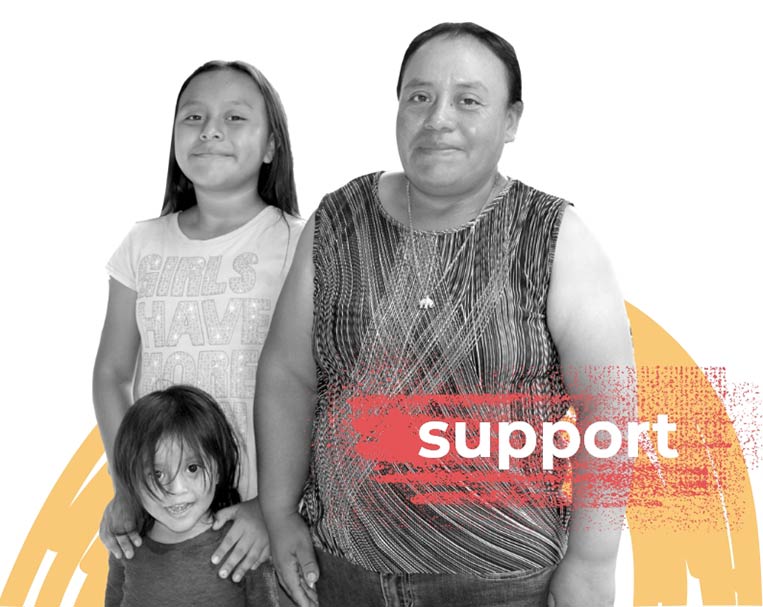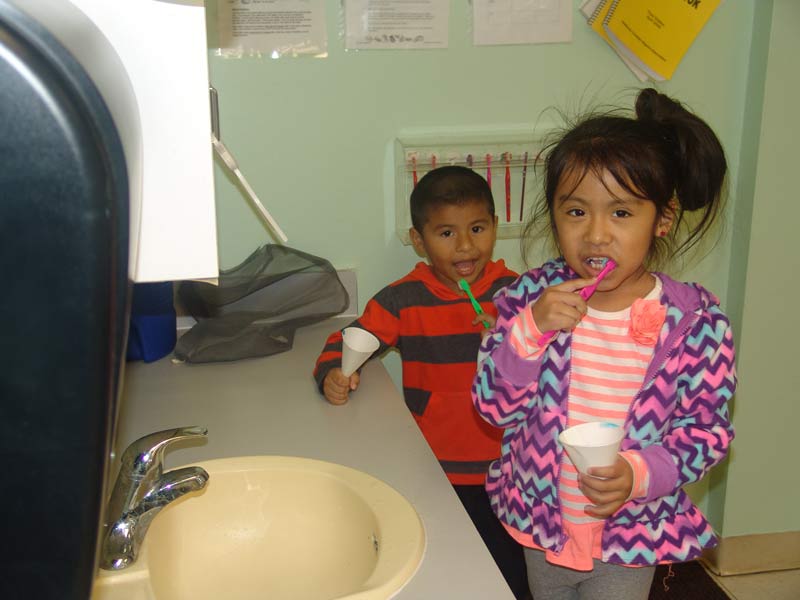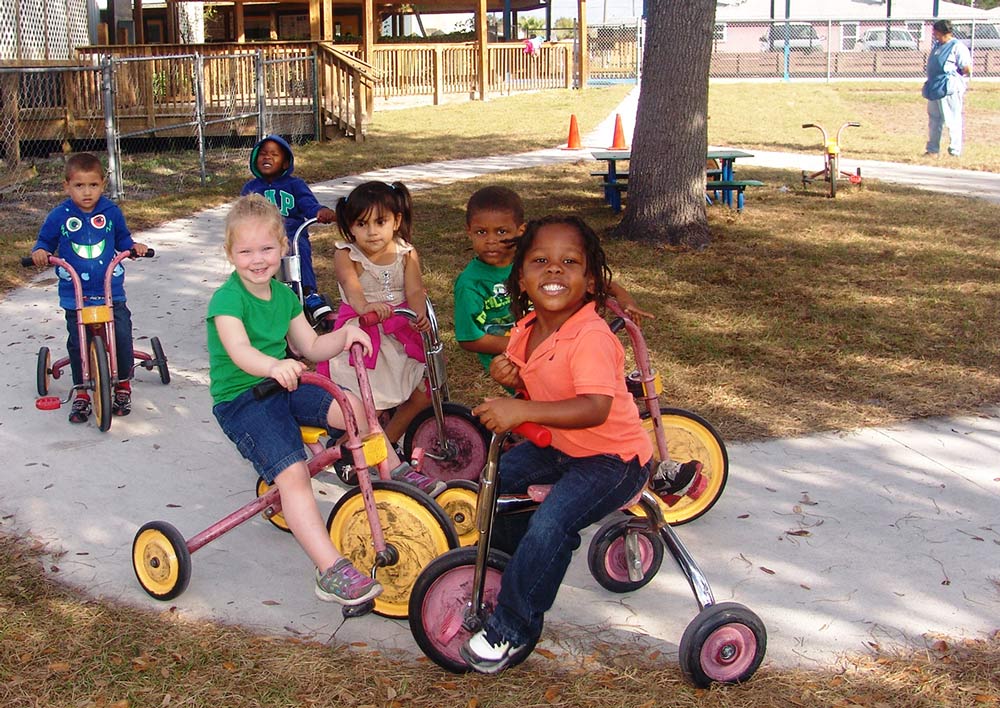
Support Head Start
The Head Start Programs at RCMA are comprehensive child-development programs that serve children from birth to age 5, pregnant women, and their families. As Florida’s largest single provider of child-care services, we even offer Voluntary Pre-K programs for children in 20 rural communities.
Child Care
We believe the health and safety of children is an essential element of education. With the help of contracted community partners and the Child Care Executive Partnership, we help low-income families get the care they need so their children can start off strong.
Our Programs
All Head Start Programs are comprehensive child-development programs that serve children from birth to age 5, pregnant women and their families.
The programs strive to increase the school readiness of young children in low-income families.
Among the almost 7,000 children served annually by RCMA, approximately: 1,700 are in Migrant and Seasonal Head Start. The Migrant and Seasonal Head Start program provides child care and a comprehensive program of health, parent involvement, and social services for preschool children of low-income and seasonal farm workers.
What services are offered?
There are four areas of service offered:
- Family and Community Partnerships
- Child Development Program
- Health Services
- Special Services
Family and Community Partnerships
Encourages parents to observe their children and to participate with them in group activities. Family Support Workers are bilingual and have work schedules that accommodate families’ needs. The program develops and maintains strong community partnerships to ensure service delivery.
Parents have opportunities for involvement in every aspect of the program. A Parent Policy Committee is active in every center, and at the state level, sharing governing responsibilities with agency boards of directors. At the centers, parents participate in literacy activities with their children, and attend other educational sessions.
Child Development Program
Provides a secure, stimulating environment in which children are helped to develop physically, emotionally, mentally, and socially. Classrooms must comply with state licensing standards and Head Start Performance Standards, offering full-time child care for children from 6 weeks to 6 years of age. The education program offers opportunities for active learning experiences for all ages. Teachers of 3, 4, and 5 year old children implement the High Scope curriculum.
In classrooms for infants and toddlers, teachers follow the methods of High Scope curriculum for infants and toddlers. The philosophy of respectful caregiving allows babies to develop at their own inherent pace, while providing them emotional support in a non-restraining physical environment.
Health Services
Collaborate with the Migrant Health Program, Public Health Departments, and other health service providers in the community to ensure children are up-to-date on a schedule of preventive and primary care – including medical, dental, immunization and nutrition screening, and exams.When children need further assessment, treatment, or therapy, follow-up care plans are developed in consultation with parents, and families are referred for services. Nutritionally balanced and culturally relevant meals are served to the children and provided, in part, through the USDA Child and Adult Care Food Program.
Bilingual mental health consultants are available to work with staff, parents, and children to promote emotional well-being to offer training and to identify local resources when referrals are needed.
Special Services
Offered to children with disabilities. They receive comprehensive and individualized services, designed and implemented in partnership with the family and the providers of services in each child’s community. These services are developed to build on each child’s capabilities and strengths.
- 1,100 are in Head Start
- Head Start is the Key to the success of RCMA in preparing young children for public school is its mission to hire staff and teachers from the communities served. Most of our staff is bilingual, and many are former farm workers, including our program manager.
- Head Start nationally evolved from a task force recommendation in 1964 for the development of a federally sponsored preschool program to meet the needs of disadvantaged children, Head Start now offers programs geared for children 3 to 5 years old.
- Early Head Start provides programs for infants and toddlers, newborns to 3 years. Responding to the unique season needs of farm workers, Migrant and Seasonal Head Start was created in 1969 and serves newborns to 5 year olds.
- Head Start is a program within the Administration on Children, Youth and Families in the U.S. Department of Health and Human Services, which awards grants to RCMA to provide these services.
Head Start programs promote the school readiness of young children from low-income families by supporting the comprehensive development of children from birth to age 5.
Head Start and Early Head Start programs offer a variety of service models, depending on the needs of the local community. Often programs are based in Head Start centers and schools. Other programs are located in child care centers and family child care homes. Many programs offer home-based services, in which a staff person visits children in their own home and works with the parent as the child’s primary teacher.
Head Start began as a program for preschoolers, and today 3- and 4-year-olds make up over 80 percent of the children served by Head Start grants each year. Early Head Start serves pregnant women, infants, and toddlers. Early Head Start programs are available to the family until the child turns 3 years old and is ready to transition into Head Start or another pre-K program.
Head Start programs support children’s growth and development in a positive learning environment through a variety of services, which include

- Early learning: Children’s readiness for school and beyond is fostered through individualized learning experiences. Through relationships with adults, play, and planned and spontaneous instruction, children grow in many aspects of development. Children progress in social skills and emotional well-being, along with language and literacy learning, and concept development
- Health: Each child’s perceptual, motor, and physical development is supported to permit them to fully explore and function in their environment. All children receive health and development screenings, nutritious meals, oral health and mental health support. Programs connect families with medical, dental, and mental health services to ensure that children are receiving the services they need.
- Family well-being: Parents and families are supported in achieving their own goals, such as housing stability, continued education, and financial security. Programs support and strengthen parent-child relationships and engage families around children’s learning and development.
Provides subsidized early childhood education and services to eligible children and families of the seasonal and migrant farmworker and rural poor community.
Generally, a families’ total household income to enroll in the School Readiness Program must not exceed 150% of the Federal Poverty Level (FPL). Families pay a copayment for child care based on total gross income and family size. You can find your copayment based on the Sliding Fee Scale.
Florida’s voluntary pre-kindergarten (VPK) program began in 2005, to improve reading readiness and early literacy skills for 4- year-old children prior to kindergarten.
RCMA, the largest single provider of child-care services in Florida, now offers VPK services in 20 rural communities. Like other children RCMA serves, most of those enrolled in VPK speak English as a second language, if at all.
With a mission of hiring staff and teachers from the communities served, RCMA already employs a majority of bilingual staffers. Many of our employees are former migrant farm workers who acquired their child development credential, family development credential, associate’s degree or bachelor’s degree after joining RCMA.
Serving a large migrant population, plus other year-round farm and low-income families, RCMA offers the 540-hour VPK program option during the typical academic year and a more condensed, 300-hour summer program in June and July.
This way, even though some children arrive late and leave early, they still receive the required coursework, which is essential to their success later in kindergarten and elementary school.
Child Care Executive Partnership (CCEP) program is a public/ private partnership program that extends early childhood education and services to working poor parents.
RCMA has recognized community partners that provide services to children and families:
- Avon Park Child Development Center
- Guadalupe Center
- Panhandle Area Educational Consortium